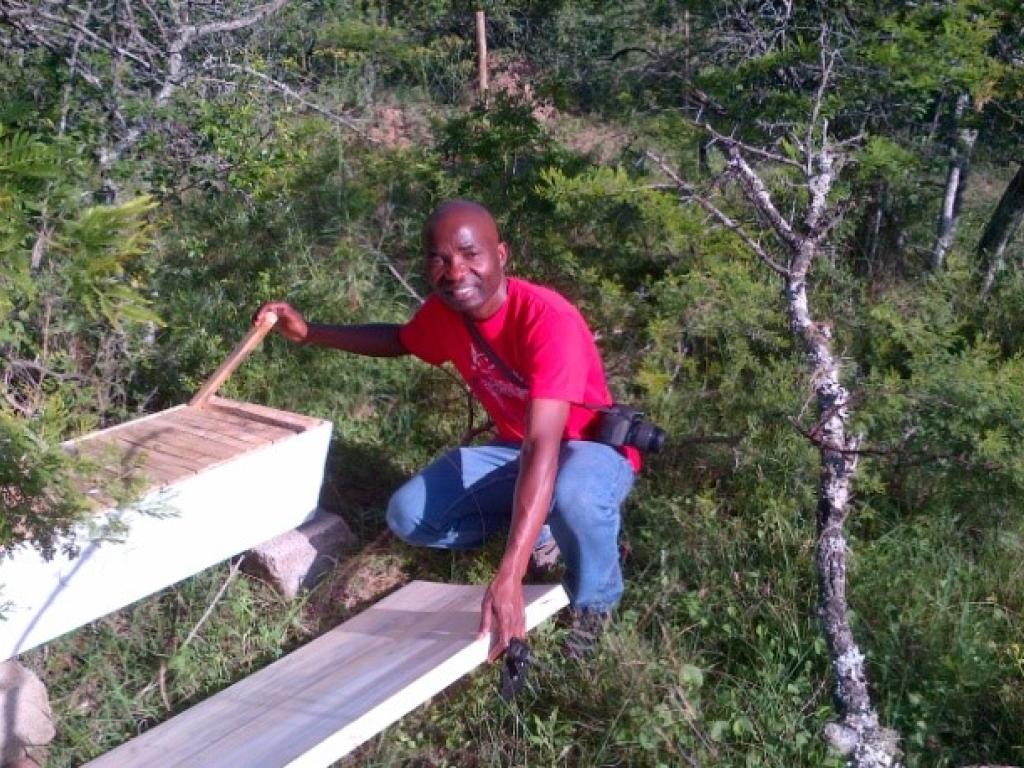How participating in CIRCLE has won one fellow big grants.

A CIRCLE fellow won R2,2 million in grants from South Africa’s grant making foundation, the National Research Foundation (NRF) in 2015 enabling him to empower indigenous communities to improve their strategies for tackling climate change.
The grants that Amon Taruvinga, a lecturer from South Africa’s University of Fort Hare, won from the NRF were from proposals inspired by his research funded by the Climate Impact Research Capacity and Leadership Enhancement in Sub-Saharan Africa (CIRCLE) programme. The CIRCLE programme is an initiative of the Department for International Development (DFID) of the United Kingdom (UK) to develop the skills and research output of early career African researchers in the field of climate change and its local impacts on development.
In 2015 CIRCLE funded Taruvinga to research how small scale farmers are adapting to climate change. He was one of the 34 fellows who were recruited in 2015 through CIRCLE to spend a year in another African institution outside their own studying the impact of climate change. Taruvinga spent his year at the University of Cape Town where his research took him to six district municipalities in the Eastern Cape province of South Africa, where he found that farmers were using various strategies to adapt including planting drought tolerant indigenous food crops like grain sorghum (Sorghum bicolor) and switching from sheep to local indigenous breeds of cattle and chicken rearing, which are more tolerant to water stress. In Amathole, one of the six district municipalities where he did his research, he found that withclimate change farmers were switching to beekeeping a rational move given that honey bees require optimum foraging temperatures between 160c – 320c, and supportive vegetation biomes with good floral diversity.
The farmers were, however, using traditional ways of bee keeping, (traditional log hives, no protective clothing, harvesting by burning the bees with fire) which curtailed their production. The challenges the famers faced in improving their production gave Taruvinga an idea to train the farmers in commercial beekeeping. He, however, needed money to conduct the training. Already experienced in grant application from his previous projects, CIRCLE enable the Zimbabwe-born researcher to hone his grant application skills leading him to successfully apply for a R100,000 training grant from the Agricultural and Rural Development Research Institute. The funding managed to establish 3 pilot apiaries each with 15 trained unemployed youth, 30 Kenyan Top Bar (KTB) hives, five protective clothing and 3 smokers. The NRF also gave him a R650,000 grant to map commercial beekeeping areas in the Amathole district municipality of the Eastern Cape province given than not all areas may support commercial beekeeping.
Using the funding he is targeting to
(a) Study the potential of various local municipalities within Amathole to commercially support beekeeping,
(b) Conduct a baseline survey on the status of beekeeping focusing on perceptions, gender dynamics, current practices, awareness and needs assessment analysis.
(c) Estimate the potential to find local, regional and international product markets for the farmers.
Taruvinga is also funding two masters students to study how his programme will impact the farmers in Amathole and to help them adding value to their honey to maximise profits from the same grant. These two grants are not the only ones that Taruvinga won during the course of his CIRCLE fellowship.
His other NRF grant in 2015 worth R30, 000 came from a proposal inspired during the inception meeting for his one-year CIRCLE fellowship. Networking with other CIRCLE fellows made him realise the need to promote collaborative research on climate change in Southern Africa leading him to form the Southern Africa Climate Change and Biodiversity Research Forum. The forum drew collaborators from Namibia, South Africa and Zimbabwe and has prompted another collaborative research project to develop an app that will provide mobile alerts for veld fires in rural areas of Zimbabwe. The prototype entitled, “Integrated mobile veld fire detection, monitoring and sharing App” has been tested at lab level showing impressive results. The forum is currently seeking for funding to pilot test the App at field level and up-scaling targeting southern African countries.
“CIRCLE groomed us to appreciate the value of collaboration and how to do so successfully. From CIRCLE we learnt how to manage conflict very likely under collaborations, and maximise on interdisciplinary synergies among other lessons,” Taruvinga says.
His big win of R1.485 million from the NRF was announced just last December, which he core-authored with his home mentor (Dr. L. Zhou – Grant Holder) and another CIRCLE fellow (Dr. K. Mopipi) from the same institution. In this project the team is seeking to understand indigenous knowledge and technological innovations on livelihood based handcrafts among rural women. In the process they hope to develop a local indigenous knowledge and technological innovations database placed in a mobile cloud application for sharing and preservation. The goal is to enable communities to learn from each other of how they can cope with climate change by diversifying their livelihoods as inspired by their indigenous knowledge.
His advice to those who want to follow his winning streak: “Be articulate in your proposal. Detail the problem that you want your research to solve and take time to prepare a good proposal.”
Adapted from origional article published on the African Academy of Sciences (AAS) website. Read original article here.
Disclaimer: The views expressed here are solely those of the author in her private capacity and do not in any way represent the views of the ACDI, or any other entity affiliated with the ACDI.